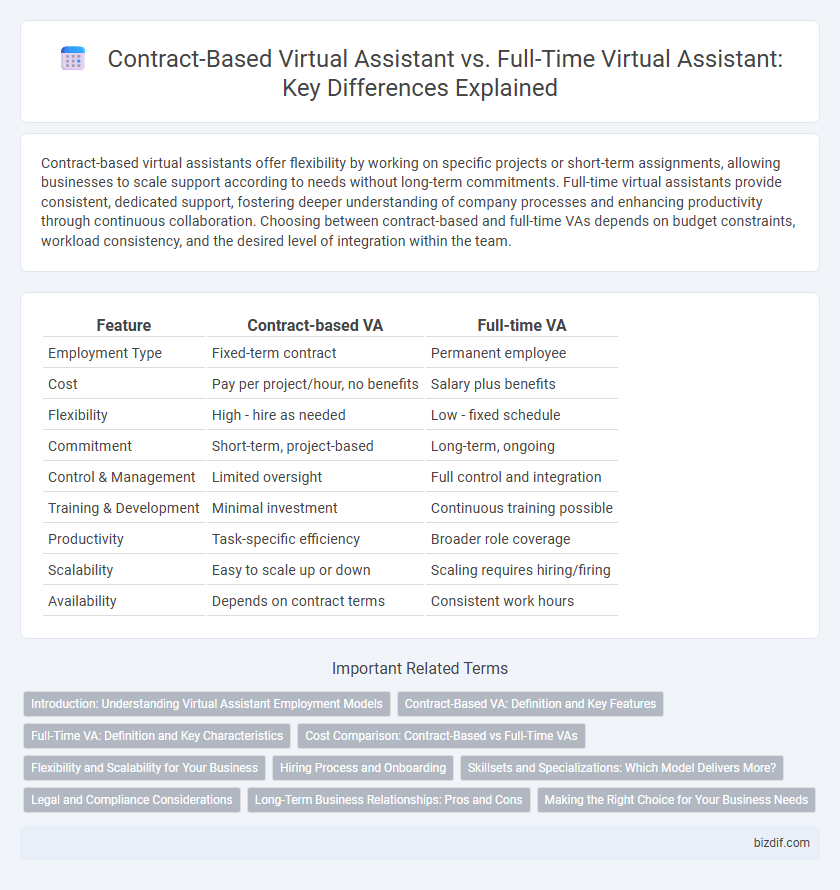Contract-based virtual assistants offer flexibility by working on specific projects or short-term assignments, allowing businesses to scale support according to needs without long-term commitments. Full-time virtual assistants provide consistent, dedicated support, fostering deeper understanding of company processes and enhancing productivity through continuous collaboration. Choosing between contract-based and full-time VAs depends on budget constraints, workload consistency, and the desired level of integration within the team.
Table of Comparison
| Feature | Contract-based VA | Full-time VA |
|---|---|---|
| Employment Type | Fixed-term contract | Permanent employee |
| Cost | Pay per project/hour, no benefits | Salary plus benefits |
| Flexibility | High - hire as needed | Low - fixed schedule |
| Commitment | Short-term, project-based | Long-term, ongoing |
| Control & Management | Limited oversight | Full control and integration |
| Training & Development | Minimal investment | Continuous training possible |
| Productivity | Task-specific efficiency | Broader role coverage |
| Scalability | Easy to scale up or down | Scaling requires hiring/firing |
| Availability | Depends on contract terms | Consistent work hours |
Introduction: Understanding Virtual Assistant Employment Models
Contract-based virtual assistants offer flexible, project-specific support ideal for businesses needing temporary or specialized tasks without long-term commitments. Full-time virtual assistants provide consistent, dedicated assistance with deeper integration into company workflows and culture, supporting ongoing operational needs. Selecting the right employment model depends on budget, workload consistency, and desired level of engagement.
Contract-Based VA: Definition and Key Features
Contract-based virtual assistants (VAs) operate under fixed-term agreements, delivering specialized tasks with clearly defined objectives and deadlines. They offer flexibility in workload management, allowing businesses to scale assistance according to project demands while typically incurring lower overhead costs compared to full-time employees. Key features include task-specific focus, variable hours, and absence of long-term employment commitments, making contract-based VAs ideal for short-term or fluctuating workload needs.
Full-Time VA: Definition and Key Characteristics
Full-time virtual assistants (VAs) are employed on a permanent basis, typically working 35 to 40 hours per week for a single employer, providing consistent and dedicated support. They possess deep knowledge of the employer's business processes and maintain long-term engagement, which enhances efficiency and trust. Full-time VAs often receive benefits similar to in-house employees, including regular pay, job security, and opportunities for professional development.
Cost Comparison: Contract-Based vs Full-Time VAs
Contract-based virtual assistants typically offer more cost flexibility by charging hourly or project rates, eliminating expenses like benefits, taxes, and office space associated with full-time employees. Full-time virtual assistants require a fixed monthly salary alongside overhead costs, which can increase the overall expenditure despite providing consistent availability. Businesses aiming to optimize expenses often prefer contract-based VAs for short-term or fluctuating workloads due to their scalable cost structure.
Flexibility and Scalability for Your Business
Contract-based virtual assistants offer unparalleled flexibility, allowing businesses to scale their workforce up or down based on current project demands and budget constraints. Full-time virtual assistants provide consistent availability and deeper integration into company operations, supporting long-term strategic goals and ongoing tasks. Choosing between them depends on the need for adaptive resource allocation versus stable, continuous support for business growth.
Hiring Process and Onboarding
Contract-based virtual assistants typically undergo a streamlined hiring process emphasizing specific project skills and quick onboarding to meet immediate needs. Full-time virtual assistants require a more comprehensive recruitment phase, including in-depth interviews and background checks, followed by extensive onboarding to integrate them fully into company operations. Efficient onboarding tailored to the employment type enhances productivity and reduces time-to-contribution for virtual assistants.
Skillsets and Specializations: Which Model Delivers More?
Contract-based virtual assistants often bring specialized skills tailored to specific projects or industries, enabling businesses to access expert talent for niche tasks such as digital marketing, graphic design, or IT support. Full-time virtual assistants provide broader skillsets with a consistent focus on long-term company objectives, enhancing overall efficiency in administrative, customer service, and operational roles. The choice depends on whether a business prioritizes specialized expertise for specific needs or comprehensive capabilities for ongoing support.
Legal and Compliance Considerations
Contract-based virtual assistants offer flexibility with engagement defined by specific terms in the service agreement, minimizing long-term legal liabilities, while full-time virtual assistants require adherence to employment laws, including benefits, tax withholding, and labor regulations. Employers must ensure contract-based VAs comply with data protection standards stipulated in the contract, whereas full-time VAs are subject to ongoing company policies and regulatory compliance frameworks. Choosing between contract-based and full-time virtual assistants hinges on balancing operational control with legal obligations related to employment classification and compliance risk management.
Long-Term Business Relationships: Pros and Cons
Contract-based virtual assistants offer flexibility and cost savings, making them ideal for short-term projects or fluctuating workloads, but they may lack the deep organizational knowledge and commitment needed for complex, ongoing tasks. Full-time virtual assistants foster stronger long-term business relationships through consistent availability, deeper integration with company culture, and better understanding of business goals, which enhances productivity and collaboration. However, employing full-time VAs can result in higher fixed costs and less adaptability to changing business demands.
Making the Right Choice for Your Business Needs
Choosing between a contract-based virtual assistant and a full-time VA depends on your business's workload flexibility and budget. Contract-based VAs offer scalability and cost-effectiveness for short-term projects, while full-time VAs provide consistent support and deeper integration into company culture. Evaluating task complexity, communication needs, and long-term goals ensures the optimal virtual assistant arrangement for operational efficiency.
Contract-based VA vs Full-time VA Infographic

 bizdif.com
bizdif.com